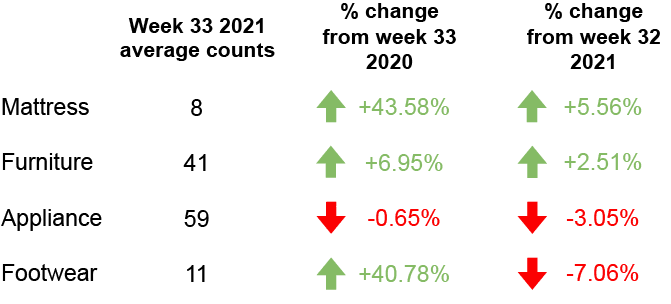
As customers continue the trend of spending more than they usually do, sales have been hotter than H-E double hockey sticks.
Some people call it revenge shopping, which is making up for lost time with increased spending. This can make it extra challenging to understand future demand and manage inventory.
So, that’s why this week we uncover how to utilize new technologies to accommodate revenge shopping and prepare for the future.
If it’s true what they say about revenge being a dish best served cold, then this is an excellent time for this week’s newsletter about how to see trends and improve your demand-sensing capabilities.
WHAT ELSE IS IN STORE THIS WEEK?
- Why Americans are spending $765 more a month than last year.
- How to understand and plan for future demand using new technologies.
- Get our upcoming research reports.
- Join our upcoming webinar
FOOT TRAFFIC INDEX
Here’s a look at last week’s foot traffic compared to the same time last year.

FOOT TRAFFIC TRENDS
Industry insights so you can convert your foot traffic into more sales.
Daily Goaling Webinar
When: Thursday, Aug 26
Time: 7am PDT/ 10am EDT
We are thrilled to share the daily goaling reports with you all!
This report offers managers and leaders a way to compare their past with their present. Daily Goaling focuses on the key components that directly impact company growth.
This compares this year to last year’s performances for sales, opportunities, closing, revenue per opportunity, average sale, and closing ratio.
Register today to learn more about how to set goals that help your team sell at their highest potential.
Retail’s sweet revenge
As a consensus, most people are feeling pretty cooped up after over a year of on and off lockdowns.
And as it turns out, American’s wallets were also feeling cooped up. On average, Americans are spending $765 more a month compared to the same time last year.
Revenge shopping as it has been coined has been the response that many Americans are taking to make up for a year of being at home and saving up money. Of the 1,000 people polled by Massmutual, 48% say they have saved less than $500 in the last three months.
For millennials and Gen-Z, who were more accustomed to going out before the pandemic, their revenge shopping has resulted in them spending an average of $1,016 more a month than last year.
Not only are millennials and Gen-Z spending more money, but they are reaching the age where they are ready to move out of their parent’s house and starting buying / renting their own place. And as we all know with a new home comes the need for furniture, mattresses, appliances, and everything else.
Understanding future demand
The buck doesn’t stop at revenge buying. Today, a 6-second video can make any couch, shoe, mattress, or any product, an instant must-have.
With e-commerce rising in popularity and social media influencing the masses on new products every day, it’s nearly impossible for retailers to anticipate demand before the trend is gone.
As trends and demands continue to come and go, it’s more important than ever to leverage technology to improve demand sensing capabilities.
Demand sensing works to eliminate supply chain lags by constantly learning and reducing the time between demand signals. While in the past, demand sensing used statistics to produce results, new technologies use artificial intelligence to continuously learn from online searches and orders.
Re-thinking the wheel
Ikea, who is at the forefront of the customer experience, has gone back to the drawing board to re-think their customer journey.
The infamous “Ikea maze” that walks people through rooms full of inspiration by following arrows on the ground is soon to be a thing of the past.
As said by Ikea, “customers will become ‘part of the furniture‘ by lounging around in the spaces, and becoming the focus of attention if they want, with the new concept aimed at encouraging sustainability.”
The decision to change the experience comes from consumers’ desire to make their homes “cozier” after spending so much time at home over the last two years.
NOTEWORTHY NEWS
Loyalty: 5 Ways to Build Highly Valuable Brand Loyalty.
Hiding in the numbers: The mathematical formula for you to retain more customers (and find new buyers).
Sustainability: 6 reasons why sustainability means growth.
Facebook Horizons: Facebook unveils Horizon Workrooms for remote co-working in VR.
RANDOM IRRELEVANCE
The ‘blackest’ black: How a color controversy sparked a years-long art feud.
Deathly kiss: Deadly ‘kissing bug’ that kills thousands needs to be taken seriously now
Disney robots: Disney Parks is adding robots that can understand you.
Baby shark: Baby smooth-hound shark could be the first confirmed case of asexual reproduction in species.
